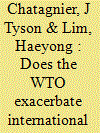| Srl | Item |
| 1 |
ID:
182672


|
|
|
|
|
| Summary/Abstract |
As one component of its mission to reduce trade barriers and encourage the liberalization of international commerce, the World Trade Organization provides states with a forum in which they can raise and resolve complaints about partners’ unfair trading practices. This mechanism streamlines the process of identifying non-compliant behavior, and provides real incentives for the removal of such policies. By furnishing a form of dispute resolution, the institution should be both trade-inducing and peace-enhancing for member states. However, this very mechanism also has the potential to aggravate existing dispute for two reasons. First, it removes the opportunity for states to use economic policies as instruments of structural linkage in resolving disputes. Second, it deprives its members of powerful economic tools that could be used in lieu of militarized responses. Using the implementation of the WTO Dispute Settlement mechanism, as well as the subsequent expiration of Article 13 of the WTO Agreement on Agriculture (the so-called ‘peace clause’), we examine whether the opportunity to resolve trade disputes through the organization affects the likelihood that member states engage in militarized conflict with one another. We find that membership in a trade institution facilitates peaceful interaction, but that judicialization erases these benefits. We conclude that institution building requires caution and attention to the possibility of unintended consequences.
|
|
|
|
|
|
|
|
|
|
|
|
|
|
|
|
| 2 |
ID:
117590


|
|
|
|
|
| Publication |
2012.
|
| Summary/Abstract |
Previous research has shown that foreign policy crises can cause a 'rally 'round the flag' effect, boosting citizens' approval of their leaders. While scholars agree on the effect's existence, its magnitude and nature are less readily apparent. This article considers two factors that have been neglected in previous studies: the context in which a conflict occurs and the public's level of trust in government. The theory presented here suggests that trust is not only an effect of a rally, but mediates the magnitude of the rally. It also proposes that the nature of the rally will be unaffected by whether the state is provoked by its opponent prior to crisis initiation. The resulting hypotheses are tested using aggregate US public opinion data around international crises, as well as individual-level data from the 1990-92 ANES panel regarding the Persian Gulf War. The analysis indicates that trust in government has a major influence on the size of a rally effect, especially at the individual level. However, trust matters more for those in the opposition than for those who have supported the government in the past. These results suggest implications for understanding public attitudes toward foreign policy and for the diversionary theory of war.
|
|
|
|
|
|
|
|
|
|
|
|
|
|
|
|